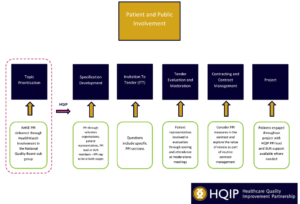Engaging patients and carers in commissioning at HQIP
HQIP is committed to patient and carer engagement and one of the ways we ensure engagement is in our core business is through our commissioning process.

We commission 60 national clinical audit and patient outcomes programmes and follow the three stages shown in Figure 1.
Stage 1 – Specification Development
HQIP’s Head of Engagement identified individuals and topic specific charities to work with to understand the views of patients and carers in the relevant area of care. We focus on understanding patient concerns, benefits and where they might like to see improvements to ensure their priorities are fed into the specification development process.
A key area where patients and carers can contribute feedback is in the resources that each project produces, or will produce, for people that use services. HQIP is highlighting the patient and carer focused information from the NCAPOP.
The following slides summarises the feedback that is collated from the engagement activity prior to finalising the specifications for each topic:
National Maternity and Perinatal Audit – March 2022
Sentinel Stroke National Audit Programme – March 2022
National Vascular Registry – February 2022
National Early Inflammatory Arthritis Audit – January 2022
National Emergency Laparatomy Audit – December 2021
Maternity and New Born Clinical Outcome Review Programme – December 2021
National End of Life Care Audit – November 2021
National Paediatrics Diabetes Audit – August 2021
National Lung Cancer Audit – May 2019
Stage 2 – Procurement
• Once the specification is finalised, we run a procurement process in which the topic is put out to tender. They are open tenders where the minutes from the specification development meeting and the specification are available for public viewing
There are specific questions in the tenders related to engaging with patients, carers and the public and is worth 10% of the final score
• The Head of Engagement sits on the scoring panel and takes the views of patients and carers forward into moderation
• The panel finalise their decision at a moderation meeting.
All projects are expected to have PPI as a core part of their programme and we monitor this through our contract management.
Service User Network (SUN) in the commissioning process
Our Service User Network helped us to co-produce a standard process for incorporating engagement into all of our commissioned work, and we have adapted the methodology for each topic. Some examples are below:
Focus groups
Increasingly current NCAPOP projects have an established advisory patient panel. We hold focus groups with members to hear about their experience – see the examples below:
Early Inflammatory Arthritis: The project’s panel attended a focused session to talk through their experiences of care and their role in development of the projects outputs.
Emergency Laparotomy: The Patients Association shared a request in their newsletter and five people responded and joined a virtual session to talk through their experience in this area of care.
Other examples of focus groups are achieved through outreach through charity networks which has led to individuals engaging and attending virtual sessions to share their views on project in question.
Individual engagement
The new online way of working has enabled more opportunity for conversations with individuals with experience:
Paediatric Diabetes – one-to-one conversations with parents of children with diabetes led to a deeper understanding of their experience. This was fed into the specification of the National Paediatric Diabetes Audit.
Questionnaires
Some audits have extensive engagement through charity involvement. We have made use of charity networks by working with them to share questions about an audit to get patient and carer views.
Epilepsy12 – Over 50 patient and carers responded to a small survey to give a wide range of views, which were fed into the specification development meeting.
Patient-focus group
Dementia – A number of relevant charities responded to our request for involvement which led to 20 patient/carer reps interested in participating in the SDM. These included patients, carers, charity reps and SUN members. We decided to hold a separate patient-focus group in which themes were developed and then shared by 4 representatives from that group at the SDM.
Patient representatives
Child Health Clinical Outcome Review Programme – Two representatives were found through their organisation and personal work in PPI and in representing children and young people. The PPI lead is taking their views forward into moderation.
SUN member representative
Mental Health Clinical Outcome Review Programme – A SUN member with lived experience is an Independent Advisory Group member for this programme and is involved in the whole commissioning process for the new contract.
We are constantly reviewing our processes to ensure the patient voice is part of our commissioning and we will be monitoring this work over the next few years.
Part of the Pilot commissioning project
During the pilot phase we worked with six SUN members to participate in a half day’s training in which we learnt about the HQIP commissioning process and focused in on procurement. During the specification development phase SUN members contributed by adding to engagement expectations and made helpful suggestions about how bidders could work with patient organisations.
Three SUN members then took their role forward as scorers for the bids that came in; they were supported through our e-procurement system and were able to send clarification questions which were then finalised during a final moderation meeting.
The HQIP team found their contributions valuable and thoughtful, SUN members gave feedback showing that they thought their opinions were considered and that they felt part of the team.
Please contact Kim Rezel to find out more about engagement in the commissioning process.

